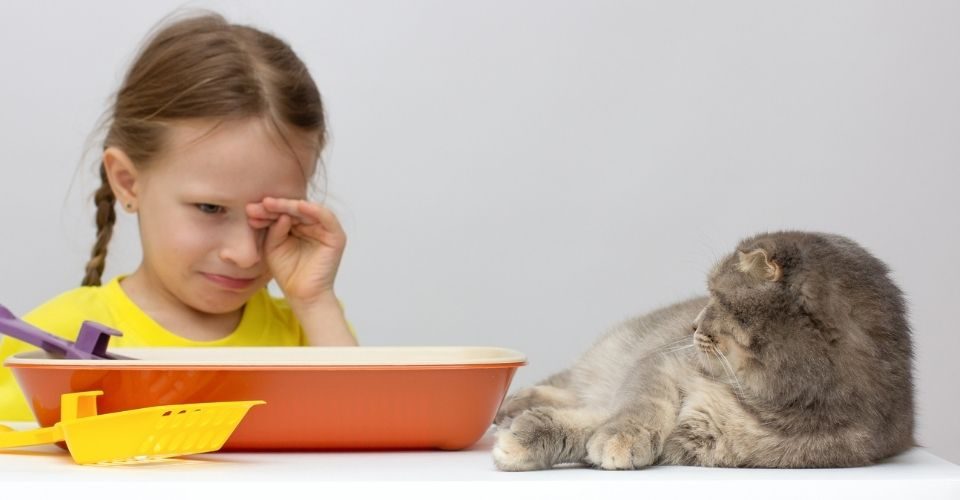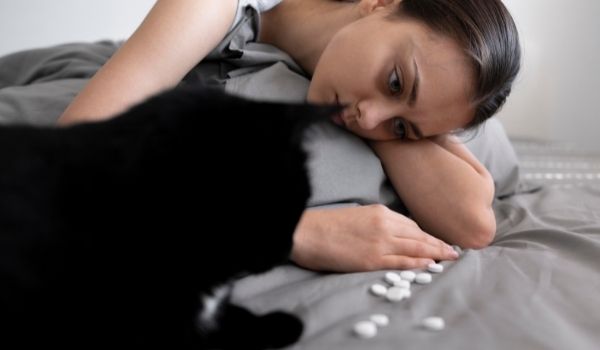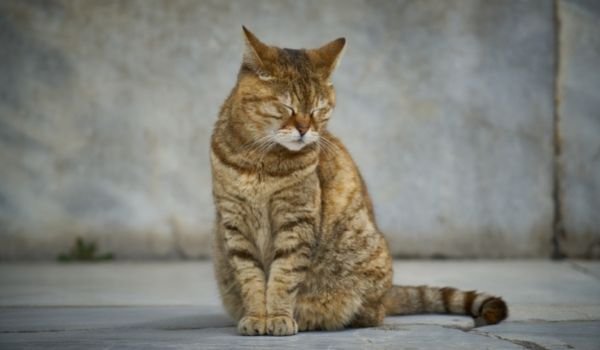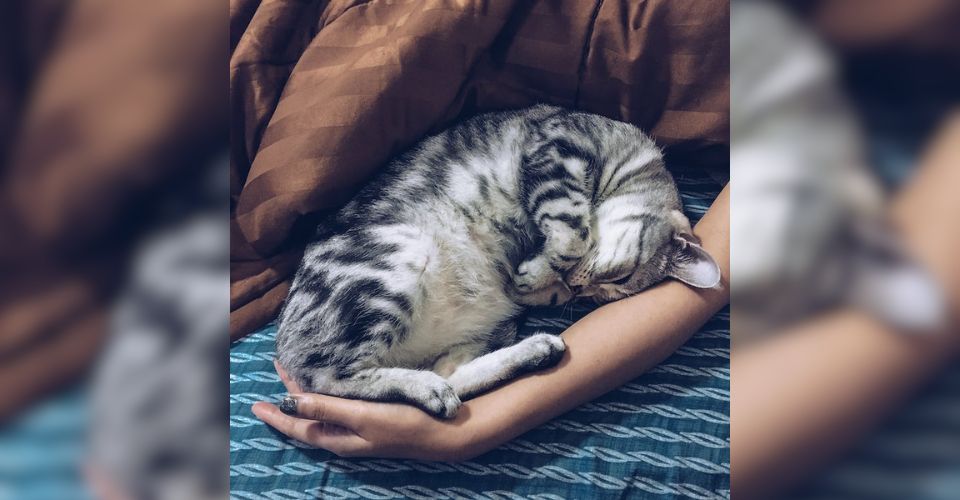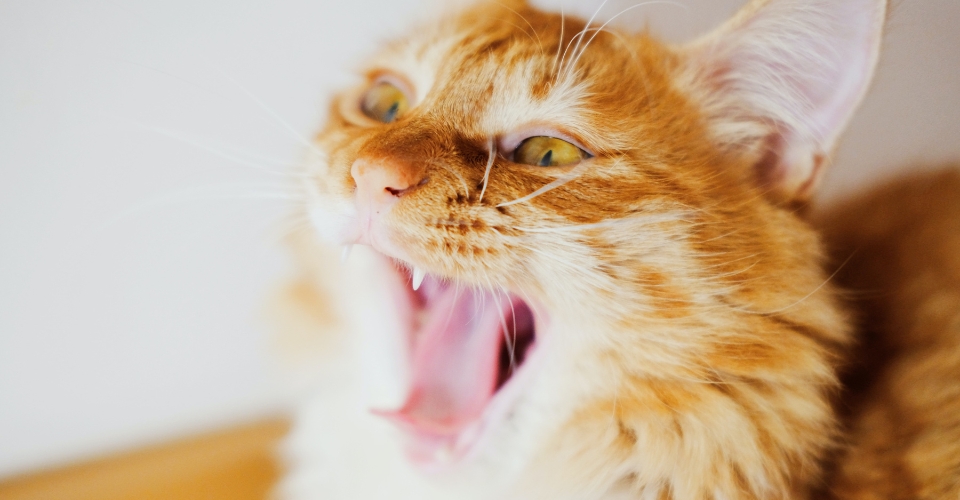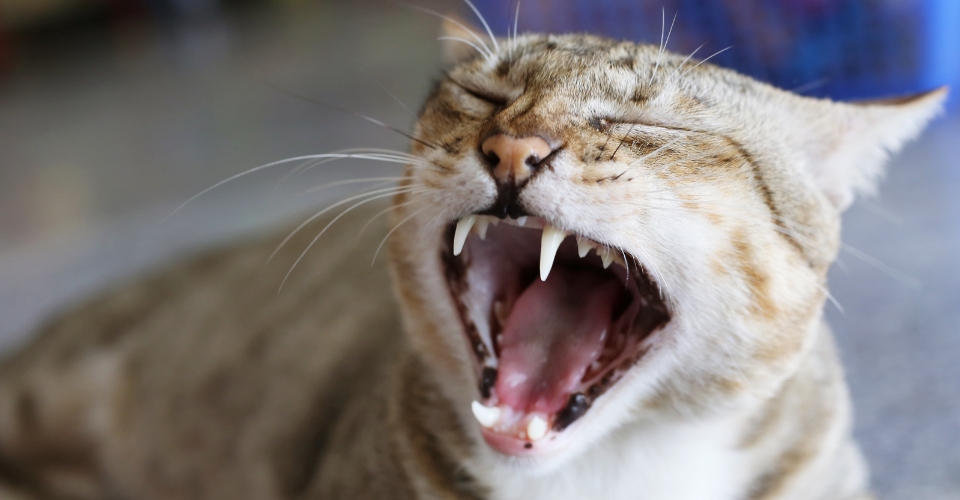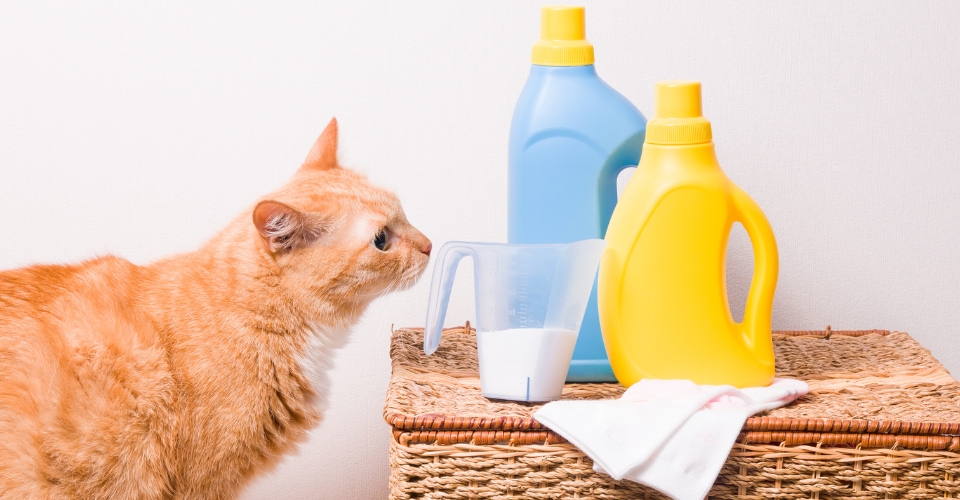Those who have never owned a cat or novice cat owners may think that cats cannot develop an emotional connection with their owners the way dogs can. They believe that as long as cats are being fed on time and their litter box is kept clean, they do not care if their owners are going through a rough patch. That is just not the case.
Cats love their owners and are most affectionate in the morning. You might often wake up to your cat sleeping on top of you or sleeping between your legs. Your cat could have found some other warm places to sleep in, but she chose you because she loves you.
So, if you have been wondering, ‘does my cat know when I’m sad,’ know that she does. However, it is not that simple – cats have a seventh sense of telling the emotional state of their favorite person.
Does My Cat Know When I’m Sad?
Yes, your cat knows when you are sad. Cats are emotionally intelligent and can tell if you are upset by sensing a change in your behavior. Not only that, cats even try to comfort their sad owners by licking their owners, lying on top of them, and headbutting them.
Even the subtlest expression of depression can tip off your kitties that something is off. This fact is backed by research: A 2015 study shows that cats are capable of reading and reacting differently to various facial expressions. During the study, when owners smiled, their respective cats reacted by purring and sitting on their laps. On the other hand, when the owners frowned or looked angry, their cats became nervous and perplexed.
Attachment and Emotions in Cats
Cats get emotionally attached to their loving owners and display this tendency as we do with each other. In fact, cats are cautious about the people they have developed a strong bond with. A 2019 experiment confirms it. The reaction of kitties with and without their owners was tested, and the result made it clear that they were far less stressed when they were near their favorite human beings. Besides, scientists also claim that cats develop emotional attachments to their owners the same way toddlers and dogs do.
Likewise, recognizing and managing emotions is not just a part of human nature – felines have this capability too. Though we cannot say for sure that cats can distinguish between happiness and sadness in humans, there is enough anecdotal evidence for us to believe that cats can sense emotions.
Role of Domestication
Cats have been coexisting with human beings for about 12 millennia. This period – long enough – has educated us about the feelings of these furry beings and vice versa. We can easily understand the emotional state of our cats by observing their body language and vocalizations. We know that where a purring is a sign of a happy cat, a squeaking cat is probably hurt, and a cat hissing is annoyed. That is why it makes sense that vice versa is also possible: cats can understand how we feel.
In this perspective, cats can feel like human beings emotionally better than others because they have been living with us for ages.
Cats Share 90% Of Our DNA! The DNA of cats and ours is 90% similar. It shows that cats may have the edge over other creatures when it comes to understanding positive and negative feelings in human beings.
How Does Your Cat Know When You Are Sad?
Disordered Schedules
The central pillar of feline intelligence is its observing capabilities. Besides stalking birds from their window perches, cats love to observe the daily activities of their owners.
If she belongs to some extra-curious breed, such as the LaPerm or the Selkirk Rex, you can expect her to be a regular stalker.
Due to such instincts, cats end up learning a lot about their favorite person’s routines, schedules, and habits. Unfortunately, our routines and daily tasks are among the first hits whenever we feel depressed. As soon as you, thus, digress from your schedule, your feline pal will be smart enough to know that there is something wrong.
Irregular Meals
When your daily schedules get affected, so do your kitty’s meal timings sometimes. Feeling unhappy, you might unknowingly forget to feed your furry friend her meal and treats on time.
Because cats are super-conscious about their food and hunger, they know that you might be having a rough day when you do not show up with their meal on time. Your cat will look for you to jog your memory about the mealtime. Hungry cats are perseverant enough to do whatever it takes to have a snack.
Voice Change
A study confirms that cats can recognize the voice of their owners. Since it is easy for them to distinguish between different voices, it is equally easy for these creatures to detect the changes in tone. Hence, having a sad voice might not let your kitty dig out the reason behind it, but she would sense that you are just not okay.
Lack of Attention
We cherish playing and spending time with our kitties. We enjoy caressing and fondling their fluffy and soft fur. However, when we feel dejected, we might not be readily available to do the same with our feline buddies anymore. Therefore, your cat can easily comprehend that there is something wrong with your mood when you no longer seek opportunities to spend time with her.
Spiritual Energy
It is a popular belief that cats have some kind of supernatural force that helps them know where a negative energy field lies. Moreover, it is a common thought that cats are talented enough to sense energy shifts in their owners. If true, it is not difficult for your cat to tell that something is out of the whack.
What Do Cats Do When We Feel Sad?
Cats are not very expressive in their reactions. But they have got the language of their own consisting of purrs, meows, hisses, squeaks, etc. Besides these vocalizations, cats show their affection to their owners through their body language. How much a cat reacts to the sadness of a person depends upon the bond between the two.
When you are sad, you might expect your cat to purr and await petting by wandering around you. She may show her love by getting closer to you, rolling, and rubbing between your legs. However, since cats are not able to understand complex emotions, you can expect more or less the same reactions from your feline regardless of the intensity of your sadness.
Overall, cats may try to comfort you by licking you or lying on your chest. Due to such behavior, they are being widely used as emotional support animals. Specially trained, these felines are good at providing mental and emotional support to their owners. Though there is no substantial evidence, cats’ purrs are claimed to have a healing effect on humans. Cats’ purrs, in the range of 20 to 140 hertz, are said to help humans reduce the stress response.
Did You Know?
When mammals feel loved, they release oxytocin, a hormone. Science, however, shows that dogs release five times more of it than cats do. Therefore, dogs are more expressive in their reactions than cats are.
Do Cats Also Feel Sad?
As discussed earlier, cats are not void of emotions, and, hence, they can feel sad. Not only sadness, but cats also feel jealousy, anger, fear, and surprise. However, since cats cannot verbalize how they feel, we can only see their emotional state by witnessing their behavior. The signs include:
- Decreased appetite
- No interest in playing
- Sleeping more than usual
- Hiding and spending time alone
- Aggression or fear
- Changes in bathroom habits
There are several reasons why a cat may get depressed, ranging from mental to physical. Nevertheless, it is very important to give her enough attention, affection, and entertainment until her happiness levels improve significantly.
Does My Cat Know When I’m Sad? Final Words
As evident from the discussion above, the answer is a resounding yes – your cat does know when you are sad. Thanks to emotional intelligence, attachment, and evolutionary history, cats percept our sadness through our behavior. Cats not only know you are sad, but they also try to comfort you during sadness by licking and headbutting you. If you are sick or just sad, your cat will not leave your side—she will lay on top of you, sleep between your legs. If you are a couch potato during a bad spell, your cat will lie next to you and just be lethargic.

